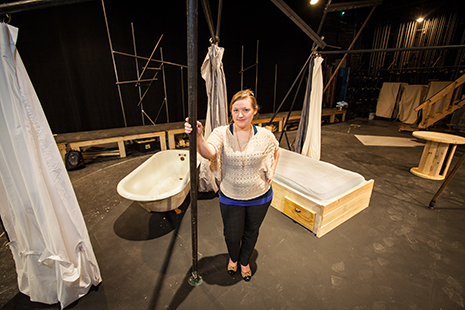
FAYETTEVILLE, Ark. – Ashleigh Burns is using physics and history to design a set for a famous American play. Jennifer Ash is studying the academic achievement of schoolchildren in El Dorado, Ark. Min Lei seeks to improve the air quality in poultry houses.
Burns, Ash and Lei are among the competitors in the University of Arkansas graduate research competition that caps Graduate Education Week, which started Monday.
More than 120 graduate students from all academic areas on campus will compete for prizes as they present the results of their research and creative work in the sixth annual contest, “From Abstract to Contract: Graduate Student Research and Creative Expression Competition.” The prizes are $200 for first place and $100 for second in several categories.
The public viewing and judging portion of the competition will be Friday from 1 to 3 p.m. at Mullins Library. In addition to the Graduate School and International Education, sponsors of the competition also include the office of the provost and office of the vice provost for research and economic development.
Burns, a master of fine arts student in scenic design, will use a poster to tell the story of how she designed the set for the forthcoming U of A production of A Streetcar Named Desire. One of the challenges she faced was constructing the steel spiral staircase towers over the stage in the University Theatre, representing the twisted relationship between two of the play’s main characters, Stanley and Stella Kowalski.
The staircase needed to be structurally sound because actors would be running up and down the stairs. So she had to understand the physics of its construction. And it needed to be placed in the right spot on stage for the actors to achieve their emotional moments, Burns said.
“The technical director and I work together to make sure everything is safe and looks cool,” Burns said. “For the set designer, you read the play and you get an emotional reaction and then you go to your research. There is a scientific method in theater. Research is the largest part of the design process.”
The students’ participation in the graduate research competition helps them prepare to present their research at national conferences. Workshops and seminars associated with the competition give students the presentation skills and confidence to successfully interact with professionals they will meet at those conferences.
Indeed, Burns will present a poster she designed for this week’s competition at the annual conference of the United States Institute for Theatre Technology, to be held in March.
Ash, a doctoral student in the department of education reform, has already presented research posters at three conferences. Her poster for the Graduate School competition is on the El Dorado Promise, a scholarship program that provides approximately $6,000 a year toward college tuition for public high school graduates in El Dorado.
She is studying the academic impact of the program on middle school and junior high students in the El Dorado schools. Ash found that the El Dorado Promise has led to academic gains for students in the fourth through seventh grades since the program was announced in 2007.
Ash, a 2004 Fayetteville High School graduate, became interested in education policy when she was a teacher in Miami-Dade County Public Schools, the fourth-largest district in the United States.
“You go into a large urban school district and you start to see a lot of problems,” Ash said. “You start to think, ‘There are serious policy problems here that I can’t do anything about as a teacher.’ I found that my interests were drawn more to the policy arena.”
While Ash is interested in policies that improve our schools, Lei wants to improve the air quality in poultry houses, particularly in Arkansas. According to the U.S. Department of Agriculture, Arkansas ranks second in annual broiler production, trailing only Georgia.
Lei, a master’s student in the department of biological and agricultural engineering, is researching the effectiveness of a biofilter, a machine placed in a poultry house that could reduce ammonia emissions. Ammonia is produced in chicken litter that collects in the bottom of industrial barns that hold thousands of birds. The strong-smelling gas is released when the barns are vented.
“Ammonia is harmful to humans and animals,” said Lei, an international student from Hangzhou, China. “It will also pollute the soil around the poultry house.”
He installed a biofilter in a poultry house on the Arkansas Agricultural Research and Extension Center, better known as the U of A farm north of campus. The biofilter absorbs and converts the ammonia into other substances.
“The result of this study will provide vital information of biofilter design in treating air pollutants from poultry housing,” he said.
Topics
Contacts
Chris Branam, research communications writer/editor
University Relations
479-575-4737,